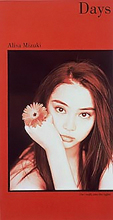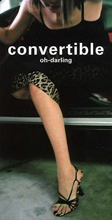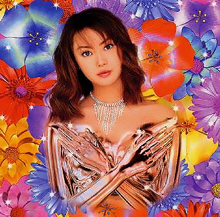
"Ai no Tame ni." is the seventh single by Japanese recording artist Aya Ueto. It was released on February 4, 2004 as the fourth and final single from Ueto's second studio album Message. The single was released in two formats: limited and standard editions, both issued with different covers.

"Densetsu no Shōjo" is the first single by Japanese recording artist Arisa Mizuki. It was released on May 15, 1991 as the first single from Mizuki's debut studio album Arisa. The title song was written and composed by Amii Ozaki. It was inspired by Anri's "Olivia o Kikinagara," also produced by Ozaki. The song was used in commercials for the Chasse soft drink by Kirin, starring Mizuki herself.

"Eden no Machi" is the second single by Japanese recording artist Arisa Mizuki. It was released on August 28, 1991 as the second single from Mizuki's debut studio album Arisa. The title song was written by Jun Taguchi and composed and produced by Princess Princess vocalist and guitarist Kaori Okui. The song is Mizuki's only A-side to not have a commercial tie-in.

"Kaze no Naka de" is the third single by Japanese recording artist Arisa Mizuki. It was released on November 21, 1991 as the third and final single from Mizuki's debut studio album Arisa. Both the A-side and B-side were written and composed by Amii Ozaki. The title track, "Kaze no Naka de," served as theme song for Mizuki's first feature film Chō Shōjo Reiko. "Graduation " served as theme song for the Japanese dub of the animated series Babar. "Kaze no Naka de," which was written for Mizuki's debut album Arisa, was released as a single at Mizuki's request.

SpeciAlisa is the sixth studio album by Japanese recording artist Alisa Mizuki, released through Avex Tune on May 25, 2011. It is Mizuki's second studio album with Avex and first in twelve years, since Innocence (1999). The title is a portmanteau of the words "special" and "Alisa." The album was released in commemoration of Mizuki's twenty-year anniversary.

"Kotoshi Ichiban Kaze no Tsuyoi Gogo" is the fifth single by Japanese recording artist Arisa Mizuki. It was released on May 12, 1993 as the first single from Mizuki's first compilation album Fiore: Arisa Collection. The title track was written and composed by Yumi Matsutoya, under the pen-name Karuho Kureta. It was used in commercials for the soft drink Chasse by Kirin, starring Mizuki herself. "Sunao ni Naritai," is Mizuki's second consecutive B-side to be written and produced by singer-songwriter Midori Karashima.

"Kimi ga Suki Dakara" is the sixth single by Japanese recording artist Arisa Mizuki. It was released on August 11, 1993 as the second single from Mizuki's first compilation album Fiore: Arisa Collection.

"Happy Wake Up!" is the seventh single by Japanese recording artist Arisa Mizuki. It was released on October 3, 1994 as the lead single from Mizuki's third studio album Arisa III: Look. The title track was written and produced by Tetsuya Komuro. "Happy Wake Up!" is Mizuki's second single produced by Komuro. The song was written at Mizuki's request for an upbeat track to sing in concert. It was used in commercials for Knorr Cup Soup by Ajinomoto, starring Mizuki herself. The B-side, "Close to You," was also written and produced by Komuro.

"Anata no Sedai e Kuchizuke o" is the eighth single by Japanese recording artist Arisa Mizuki. It was released on February 13, 1995, as the first single from Mizuki's fourth studio album Cute.

"Dakishimete!" is the ninth single by Japanese recording artist Arisa Mizuki. It was released on May 24, 1995 as the second single from Mizuki's fourth studio album Cute. Both the title track and B-side, "Zutto Soba ni Ite," were written by Masanori Nagaoka, and composed by Yasuhiko Hoshino. "Dakishimete!" was used in commercials for Umi to Taiyō no Megumi de Arau Body Soap by Shiseido, starring Mizuki herself.

"Promise to Promise" is the twelfth single by Japanese recording artist Arisa Mizuki. It was released on July 24, 1996 as the first and only single from Mizuki's second compilation album Arisa's Favorite: T.K. Songs, which features the "Urban Street Mix" version. The "Straight Run" version was included on Mizuki's third compilation album Fiore II. The title track served as theme song for the first season of the Fuji TV drama Nurse no Oshigoto, starring Mizuki herself. "Promise to Promise" was written by Tetsuya Komuro and Takahiro Maeda, and composed and produced by Komuro, making it Mizuki's fourth single to be produced by Komuro. Komuro wrote the song after having read the script for the drama.

"Days" is the fourteenth single by Japanese recording artist Alisa Mizuki. It was released on November 19, 1997 as the fifth and final single from Mizuki's third compilation album Fiore II. It was also included on Mizuki's fifth studio album Innocence. The title track was written and produced by former Every Little Thing keyboardist Mitsuru Igarashi and served as theme song for the second season of the Fuji TV drama Nurse no Oshigoto, starring Mizuki herself. "Days" is Mizuki's first release under the record label Avex Tune.

"Oh Darling" is a single by Japanese recording artist Alisa Mizuki, released under the unit name Convertible, which is composed of Mizuki and Japanese model Kayato. It was released on July 8, 1998 as the third single from Mizuki's fifth studio album Innocence. The title track was written by Tetsuya Komuro and Marc Panther and composed and produced by Komuro. "Oh Darling" is Mizuki's fifth A-side to be produced by Komuro, the first since "Promise to Promise" (1996). The song served as theme song for the Fuji TV Getsuku drama Boy Hunt, starring Mizuki herself.

"Megami no Mai" is the nineteenth single by Japanese recording artist Alisa Mizuki. It was released on August 23, 2000 as the second single from Mizuki's fourth compilation album History: Alisa Mizuki Complete Single Collection.

"Love Potion" is the twenty-first single by Japanese recording artist Alisa Mizuki. It was released on August 21, 2002, as the fifth single from Mizuki's fourth compilation album History: Alisa Mizuki Complete Single Collection. The title track is a Japanese-language cover Christina Aguilera's "Genie in a Bottle" (1998). The Japanese lyrics were written by Takeshi Aida (相田毅). The song served as theme song for the fourth and final season of the Fuji TV drama Nurse no Oshigoto.

Arisa II: Shake Your Body for Me is the second studio album by Japanese recording artist Arisa Mizuki, released through Nippon Columbia on October 1, 1992. Arisa II: Shake Your Body for Me is predominately a pop and dance music album. It is written and produced by an array of famous Japanese musicians, including Anri, Keizō Nakanishi, Takao Konishi, and Tetsuya Komuro.

Fiore is the first compilation album by Japanese recording artist Arisa Mizuki, released through Nippon Columbia on October 1, 1993. The eleven-track set features a selection of songs from Mizuki's first two studio albums, Arisa and Arisa II: Shake Your Body for Me, as well as two original songs. It is Mizuki's first album to include the original versions of both "Densetsu no Shōjo" (1991) and "Too Shy Shy Boy!" (1992).

Arisa III: Look is the third studio album by Japanese recording artist Arisa Mizuki, released through Nippon Columbia on December 24, 1994. It is predominately a pop and dance music album that features songs written and produced by an array of famous Japanese musicians, including Anri, Yasuharu Konishi, Keizō Nakanishi, Takao Konishi, Chika Ueda, and Tetsuya Komuro. Arisa III: Look is Mizuki's first studio album in over two years.

Cute is the fourth studio album by Japanese recording artist Arisa Mizuki, released through Nippon Columbia on July 21, 1995. It is predominately a pop music album. Cute was released only seventh months after Arisa III: Look and is Mizuki's last studio album to be released under Nippon Columbia. The album produced two singles, "Anata no Sedai e Kuchizuke o", written and produced by Tetsuya Komuro, and "Dakishimete!." Both singles debuted within the top twenty, with "Anata no Sedai e Kuchizuke o" becoming Mizuki's last single to break the top ten. Despite not being released as a single, track seven, "Kagayaite Ite ," was used as theme song for the NHK television and radio program Minna no Uta throughout June and July 1995.

Arisa's Favorite: T.K. Songs is the second compilation album by Japanese recording artist Arisa Mizuki, released through Nippon Columbia on November 27, 1996. The twelve-track set is a collection of songs written and produced by Tetsuya Komuro, selected from Mizuki's past albums and singles. The compilation is Mizuki's last album on which she is credited as Arisa Mizuki.




















